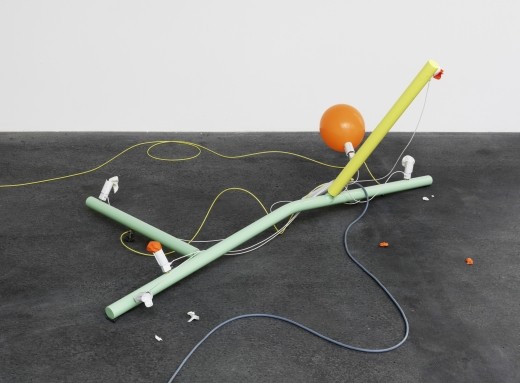Andreas Zybach
22 Mar - 23 Apr 2011
ANDREAS ZYBACH
22 March – 23 April, 2011
Johann König, Berlin is pleased to announce its fourth solo exhibition of Andreas Zybach. Zybach is presenting new sculptures and drawings.
The electronically controlled sculptures consist of compressors, pipes, valves, metal colored tubes, and balloons. The objects, formally resembling trees, are systems that remove the air from the room in order to compress it, save it and, in different time intervals, to inflate the balloons, the most flexible parts of the otherwise static structure. Similar to leaves or fruit on a tree, the balloons 'grow' until they burst, distributing the otherwise invisible material, air, back into the room. Therefore, the experiment runs without effecting a lasting or permanent change. Throughout the exhibition, available for free, are posters composed of collected fragments of offers and initiatives around the planting of trees. What they have in common is that they propose the planting of trees, in large or small numbers, to compensate for various forms of production in which carbon dioxide is formed and released into the environment.
This raises the question of why the relatively arbitrary selection of the tree over all other components of the biomass. For not only trees have the capacity to store carbon dioxide naturally, and this capacity declines after a short time through the decomposition process (unless this were slowed down over millions of years by the tree’s transformation into oil). Moreover, the vast majority of oxygen production is done by unicellular organisms living in the oceans. Perhaps the cause for the protagonist’s detachment from its indigenous context lies in its visual appeal. Its cultural significance and history as a supplier of building materials and energy then continues as a container for unwanted, invisible material.
Andreas Zybach (* 1975, Olten, Switzerland) lives and works in Berlin. He studied at the College of Design in Zurich and the Städel School in Frankfurt / Main at Thomas Bayrle. His works have been shown at the Schirn Kunsthalle, Frankfurt / Main and in a solo exhibition at P.S.1 MoMA, New York. In 2007 he received the Manor Art Award and was recently one of the four winners of the Ars Viva Prize on the topic of the laboratory. The associated exhibition series still guest this year at SALT Beyoğlu, Istanbul and at the Kunstmuseum Stuttgart, Germany.
22 March – 23 April, 2011
Johann König, Berlin is pleased to announce its fourth solo exhibition of Andreas Zybach. Zybach is presenting new sculptures and drawings.
The electronically controlled sculptures consist of compressors, pipes, valves, metal colored tubes, and balloons. The objects, formally resembling trees, are systems that remove the air from the room in order to compress it, save it and, in different time intervals, to inflate the balloons, the most flexible parts of the otherwise static structure. Similar to leaves or fruit on a tree, the balloons 'grow' until they burst, distributing the otherwise invisible material, air, back into the room. Therefore, the experiment runs without effecting a lasting or permanent change. Throughout the exhibition, available for free, are posters composed of collected fragments of offers and initiatives around the planting of trees. What they have in common is that they propose the planting of trees, in large or small numbers, to compensate for various forms of production in which carbon dioxide is formed and released into the environment.
This raises the question of why the relatively arbitrary selection of the tree over all other components of the biomass. For not only trees have the capacity to store carbon dioxide naturally, and this capacity declines after a short time through the decomposition process (unless this were slowed down over millions of years by the tree’s transformation into oil). Moreover, the vast majority of oxygen production is done by unicellular organisms living in the oceans. Perhaps the cause for the protagonist’s detachment from its indigenous context lies in its visual appeal. Its cultural significance and history as a supplier of building materials and energy then continues as a container for unwanted, invisible material.
Andreas Zybach (* 1975, Olten, Switzerland) lives and works in Berlin. He studied at the College of Design in Zurich and the Städel School in Frankfurt / Main at Thomas Bayrle. His works have been shown at the Schirn Kunsthalle, Frankfurt / Main and in a solo exhibition at P.S.1 MoMA, New York. In 2007 he received the Manor Art Award and was recently one of the four winners of the Ars Viva Prize on the topic of the laboratory. The associated exhibition series still guest this year at SALT Beyoğlu, Istanbul and at the Kunstmuseum Stuttgart, Germany.

